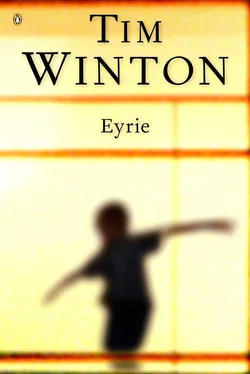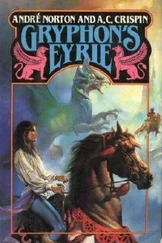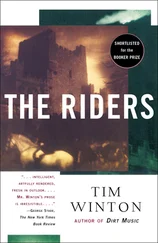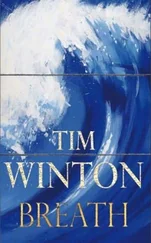He had to let it go. Doris’s scarifying empathy. The known unknown. All of it.
I have, he told himself, I’ve let it go.
Which was bullshit, really, but he kept thinking it because it seemed necessary.
I’m okay, he muttered aloud.
Which seemed slightly safer as a proposition but hardly sound.
I’m good! he announced to a startled passer-by.
And yet, righteous as he was in his misanthropic way, goodness was something of a stretch. Misunderstood Keely was. Yes. And it was true his intentions were invariably good. But only when he had them. Some days he struggled to even form an intention.
He teetered at the fulcrum of his lighter mood. Darkness sucking at him.
But the evening air was all salty grace. Close to the water it smelt divine, felt merciful. And whatever bollocks he told himself, however feeble and false the positive lingo was once you stacked it up against shitful reality, the lovely, saving night stole up on him. The rest didn’t matter. For reasons he couldn’t fathom, the hopelessness suddenly lost ultimate power over him. As if for a moment the chains fell off and his heart was free. Well, on the lam at least.
He ambled along the wharf past rank-smelling sheds where the Leeuwin rode the tide on creaking hawsers. On deck, beneath the maze of spars and rigging, a dreadlocked kid stood hosing crates, the lights glancing off piercings in his face. To Keely he looked exultant, like a boy unable to credit his own youth and beauty and good fortune. To be there on a tallship as passing strangers took note — that had to be worth something, worth basking a few minutes in the palpable sense of envy and mystery, worth prolonging a simple task like rinsing dive crates. Barely suppressing the urge to huzzah, Keely bore on past families of low-murmuring Vietnamese as they reeled in minuscule yellowtail and fingerling trevally. He turned a forgiving eye to their lard buckets of bloody water teeming with fins and white bellies and hundreds of golden tails. He didn’t stoop to scowl or tut. They were folks catching a feed: tired, shy, suspicious. They didn’t need his purse-lipped concern tonight. The concrete wharf was gummy with pollard, mired with the innards of crushed blowfish, spangled with scales. Bored schoolgirls sat on milk crates, texting, jiggling, hating to be there while their fathers and grandfathers squatted in plastic sandals, grey trousers and white singlets to thread maggots onto tiny hooks and press damp pollard into berley cages. Peaceable, calm, purposeful folks. Keely strolled on — living, letting live.
Out towards the end of the quay, in the lee of the shiny new museum, he rested against a bollard to watch a pair of romancing backpackers share a can of beer. Birkenstocks, topknots, golden limbs. They stared across at the otherworldly light of the container terminal. Their voices were soft and foreign. They sounded Nordic. And they gave off an irrepressible sense of contentment, as if this warm evening at the far end of the earth had been worth the journey. He lingered a moment, riding the swell of the contact high. Until they gave him a look that sent him on his way.
When the lift door opened at the tenth floor Gemma Buck stood waiting in some kind of uniform.
Bloody hell, she said. What’s the odds?
Hi again, said Keely as they stepped around each other awkwardly to exchange places.
Out for dinner? she asked, holding the door back with a downy arm.
Just a walk, he said. You?
Work.
In the hard light of the lift’s fluorescent he saw the supermarket logo across the breast of her tunic.
Nightshift?
Packin shelves, she said. It’s real fulfillin.
Keely smiled. Gemma tugged a bag across her shoulder. In her hand was an unlit cigarette. A moment passed and she gave a wry grin. As the door began to close once more Keely stepped into its path and let it butt his hip.
What’d you forget?
Your boy. I mean, I just…
Asleep, said Gemma.
Keely stood there with the door shoving at him, conscious of how much he’d assumed about her with no solid idea of her circumstances. For a moment he’d even thought she was leaving the child unattended.
He’s a nice kid.
Yeah. He is.
Listen, sorry about today.
Gemma shrugged.
I was a bit of a mess.
You reckon?
I didn’t mean to be rude.
Orright.
I guess we’ll talk.
Sorry?
Maybe catch up on things.
Oh. Yeah. Maybe.
Well. Let you go.
Night, she said.
He stepped back and the door finally closed.
For half a minute he stood there as the lift groaned and clanked down the shaft. Tired as he was, he knew he wouldn’t sleep. Or call his mother. He wouldn’t call Faith back, either, because it’d only set him off on some melancholy tangent. He’d watch some ancient B-movie and hope sleep stole up on him.
As soon as he’d let himself in the phone rang. He hesitated a moment, then snatched it up. Instead of Faith it was Doris.
What’s up? he asked.
I’m watching Victor Mature. Could you imagine Samson being quite so wet-lipped and doe-eyed? I don’t think so.
So, I take it Faith called you.
Yes, but love set me free.
Very funny, Mum.
I called before, she said.
I went for a walk.
Good idea.
Well, it wasn’t a Eureka moment. But yeah, it was nice.
Faith says you ran into one of the Buck girls.
That’s right. Gemma.
God, she was a beautiful child. Don’t you remember that gorgeous hair?
Hmm.
She was like a little doll.
Whatever happened to them? he said. The parents.
Bunny left him in the end. John died at Port Hedland in the eighties. I used to wonder she didn’t kill him herself. Believe me, there were times when I could have done it for her.
You were good to them. I haven’t forgotten.
Tommy.
I mean, how it was, what you did.
You okay?
Mum, I went for a walk. I’m fine.
I’m sorry. I didn’t mean to —
Not a problem.
Tom, I’m not worried.
He laughed.
Why are you laughing?
Well, Doris dear, not worrying seems to be a special mum-thing.
Okay, she admitted. Caught.
I give you cause, I know.
You’re fine, love.
Anyway, tonight you shouldn’t fret.
It’ll get better, Tom.
Yeah, he murmured. I expect so.
Let’s have lunch.
No worries.
Monday?
Alright.
Call you Sunday night?
Sure.
Love you.
You too.
When he hung up, Keely realized his mother had barely asked about Gemma. It was unlike her. Perhaps it was a sign of how worried she was. Or how far she’d left the old days behind her. Maybe he’d figure that out at lunch. But his buoyant mood was gone.
He lingered near the slider, flexed his toes in the nap of the carpet, felt nothing and was not much comforted.
Felt a little thump. From whatever. Like an elbow against the wall of his skull. The tenant turning over in bed.
He gobbed a couple of Nurofen Plus. A bit of sandbagging for good measure.
Turned on the telly. And there he was in his loincloth. Victor Mature, looking camp as a row of tents. Soon to be eyeless in Gaza.
Turned it off. Stared at his sadsack reflection in the window. Knew he’d end up back at the knife drawer any minute. For something to kick him over the edge. Tried to stare himself down. Et cetera. And blinked, of course.
A wrenching gasp and there he was. On the bed in the foetid room. Every surface dancing and flashing. A streetsweeper droned far below. Blood spritzed in his limbs as if he’d only just come off the boil.
Three o’clock. He’d been dreaming — something awful, something that had mercifully evaporated the moment he woke.
Читать дальше












